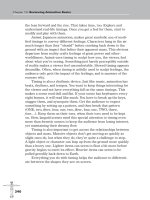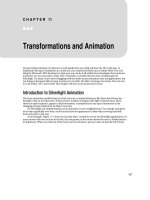CAFFEIN TED ANIMATION
Bạn đang xem bản rút gọn của tài liệu. Xem và tải ngay bản đầy đủ của tài liệu tại đây (57.45 KB, 5 trang )
HOW DOES CAFFEINE KEEP US AWAKE?
Over 100 000 metric tons of caffeine are consumed around the world every year. That’s
equivalent to the weight of 14 Eiffel Towers. Most of this caffeine is consumed in
cofffee and tea. But it’s also ingested in some sodas, chocolate, caffeine pills and even
baverages labeled decaf.
Caffeine helps us feel alert, focused, happy and energetic even if we haven’t had an
enough sleep. But it can also raise our blood pressure and make us feel anxious. It’s the
world’s most widely used drug. So how does it keep us awake?
Caffeine evolved in plants where it serves a few purposes. In high doses, as it’s found in
leaves and seeds of certain species, it’s toxic to insects. But when they can consume it in
lower doses, as it’s found in nectar, it can actually help them remember and revisit
flowers.
In the human body, caffeine acts as a stimulant for the central nervous system. It keeps
us awake by blocking one of the body’s key sleep-inducing molecules, a subtance’s
called adenosine. Your body needs a constant supply of energy, which it gets by
breaking down a high-energy molecule called ATP. In the process, it liberates adenosine,
ATP’s chemical backbone. Neurons in your brain have receptors perfectly tailored to
this molecule. When adenosine docks to these receptors, it actives a cascade of
biochemical reactions. That cause neurons to fire more sluggishly and slow the release
of important brain-signaling molecules. In other words, you get sleepy
Caffeine is what’s called an adenosin receptor antagonist. That means it derails this
process of slowing your neurons down by blocking adenosine recpetors. Caffeine and
adenosin have a similar molecular structure, close enough that caffeine can wedge into
the adenosine receptors, but not close enough to activate them. To summarize,
adenosine inhibits your neurons, caffeine inhibits the inhibitor. So, it stimulates you.
Caffeine can also boost positive feelings. In some neurons, the adenosine recpetors are
linked to receptors for another molecule called dopamine. One of dopamine’s roles in
the brain is to promote feelings of pleasure. When adenosine docks in one of these
paired receptors, that can make it harder for dopamine to fit in its own spot, interrupting
its mood-lifting work. But when caffeine takes adenosin’s place, it doesn’t have the
same effect and dopamine can slide in.
There’s evidence that caffeine’s effects on adenosine and dopamine receptors can have
long-term benefits, too, reducing the risk of diseases like Parkinson’s, Alzheimer’s and
some types of cancer. Caffeine can also ramp up the body’s ability to burn fat. In fact,
some sports organizations think that caffeine gives athletes an unfair advantage and
have placed limits on its consumption.
From 1972 until 2004, Olympic athletes had to stay below a certain blood-caffeine
concentration to compete. Of courese, not all of caffeine’s effects are so helpful. It
might make you feel better and more alert, but it can also raise your heart rate and blood
pressure, cause increased urination and diarrhea and contribute to insomnia and axiety.
Plus, the foods and beverages caffeine is found in have their own impacts on your body
that have to be taken into account.
Your brain can adapt to regular consumption of caffeine. If your adenosine receptors are
perpetually clogged, your body will manufacture extra ones. That way, even with
caffeine around, adenosine can still do its job of signaling the brain to power down.
That’s why you may find you need to consume more and more caffeine to feel as alert.
There are more and more adenosine receptors to block. It’s also why if you suddenly
quit caffeine, you may experience an unpleasant withdrawal. With plenty of receptors
and no competition, adenosine can work overtime, causing symptoms like headaches,
tiredness and despressed moods. But in a few days, the extra adenosine receptors will
disappear, your body will readjust and you’ll feel just as alert as ever, even without an
infusion of the world’s most popular stimulant.
−
−
•
Raise (v) /reɪz/
Evolve (v) /iˈvɑːlv/ tiến hóa
[intransitive, transitive] (biology) (of plants, animals, etc.) to develop over time,
often many generations, into forms that are better adapted to survive changes in
•
•
−
−
•
•
their environment.
evolve (from something) The three species evolved from a single ancestor.
evolve something The dolphin has evolved a highly developed jaw.
Nectar (n) /ˈnektər/ a sweet liquid that is produced by flowers and collected
by bees for making honey.
Revisit sth (v) /ˌriːˈvɪzɪt/
revisit something to visit a place again, especially after a long period of time
revisit something to return to an idea or a subject and discuss it again
It's an idea that may be worth revisiting at a later date.
−
•
−
−
−
−
−
•
•
−
−
•
Tailored (a) /ˈteɪlər/ tương thích
To tailor sth for/to sb/st: làm cho cái gì thích ứng với ai/ cái gì.
Dock (v) /dɑːk/ cập bến
Sluggishly (adv) /ˈslʌɡɪʃli/ more slowly than normal and in a way that seems lazy
Derail (v) /dɪˈreɪl/ làm trật bánh
Wedge into: chèn vào /wedʒ/
Ramp up (phrasal verb) /ræmp/
ramp something up: to make something increase in amount
The company quickly ramped up production to meet the demand.
Urination (n) /ˌjʊrɪˈneɪʃn/ the action of getting rid of urine from the body
Take into account (idiom)
take account of something, take something into account: to consider
•
particular facts, circumstances, etc. when making a decision about something
The company takes account of environmental issues wherever possible.
Coursework (khóa học) is taken into account as well as exam results.
The defendant (bị cáo) asked for a number of other offences (tội danh) to be taken
−
•
into account.
Perpetually (adv) /pərˈpetʃuəli/
in a way that continues
•
•
for
a
long
time
~ CONTINUOUSLY (1)a perpetually changing environment
without
interruption
•
in a way that is frequently repeated, in a way that is annoying
•
~ CONTINUALLY (2)a writer who is perpetually ignored by critics.
in a way that lasts forever ~ PERMANENTLY (3) Water provides cost-free energy
−
for generating electricity that is perpetually renewable.
Clog (v) /klɑːɡ/ [transitive, often passive, intransitive] to block something or to
•
become blocked
clog something (up) (with something)
The narrow streets were clogged with traffic.
Tears clogged her throat.
The wheels got clogged up with mud (bùn).
•
−
•
clog (up) (with something) Within a few years the pipes began to clog up.
Infusion (n) /ɪnˈfjuːʒn/
[countable, uncountable] infusion of something (into something) (formal) the
act of adding something to something else in order to make it stronger or more
successful
a cash infusion into the business
an infusion of new talent into science education
The company needs an infusion of new blood (= new employees with new
•
•
ideas).
[countable] a drink or medicine made by leaving herbs, etc. in hot water
an infusion of camomile (hoa cúc)
[countable, uncountable] (medical) an act of slowly putting a drug or other
substance into a person’s vein; the drug that is used in this way









